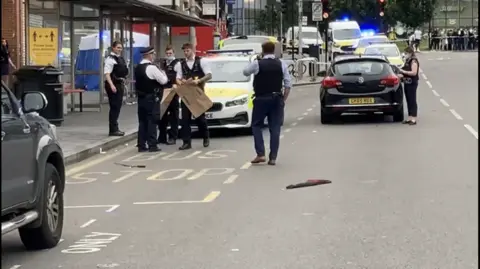Knife Crime Prevention Orders piloted to stop stabbings
 BBC
BBCA 14-month trial which would give the Met Police powers to stop youngsters aged 12 and above who they believe may be carrying knives, is being introduced.
A Knife Crime Prevention Order (KCPO) will give police the authority to target those who regularly carry knives, or have knife-related convictions.
Youngsters could face conditions such as curfews and restrictions on their use of social media under the orders.
London has seen a spate of knife-related crime within the past week.
The KCPOs would be in place for a maximum of two years and be reviewed by the courts after 12 months, with orders issued to under-18s to be reviewed more regularly.
Breaching the order will be a criminal offence punishable by a maximum prison sentence of two years, if convicted.
'A better life'
Lorraine Jones, whose son Dwayne Simpson was stabbed to death, described the orders as "an opportunity to work with these young people who are broken".
She said: "Knife crime is being done by even younger people now. We'll have that opportunity to work intensively with them instead of just sending them to prison.
"We want to be able to help them work through the problems that they have."
Crime and policing minister Kit Malthouse described the launch of KCPOs "as a really useful new tool in directing people away from knife crime towards a better life".
He said: "There are so many young people who don't engage and this gives a sense of compulsion to that engagement which we hope will get more of them over the line."
'Blunt tool'
However, Emmanuelle Andrews from human rights group Liberty, said the policy was a "blunt tool"
"Instead of criminalising children as young as 12 and funnelling more and more people into the criminal justice system with KCPOs, the government should be looking to invest in communities and tackle the root causes of serious violence.
"That means moving away from ever-expanding discriminatory police powers, and instead investing in things like mental health care, housing, education and youth services."
